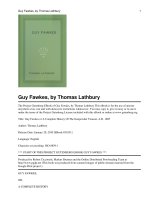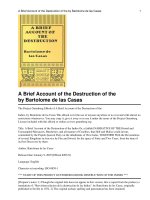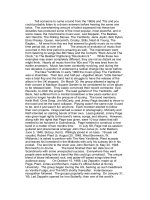a brief history of the olympic games
Bạn đang xem bản rút gọn của tài liệu. Xem và tải ngay bản đầy đủ của tài liệu tại đây (2.09 MB, 198 trang )
A Brief History of the Olympic Games
BHOA01 16/4/04, 4:42 PM1
Brief Histories of the Ancient World
This new series offers concise, accessible, and lively accounts of
central aspects of the ancient world. Each book is written by an
acknowledged expert in the field and provides a compelling over-
view, for readers new to the subject and specialists alike.
Published
A Brief History of the Olympic Games
David C. Young
In Preparation
A Brief History of Astrology
Roger Beck
A Brief History of Oracles, Divination, and Prophecy
Sarah Iles Johnston
BHOA01 16/4/04, 4:42 PM2
A Brief History
of the Olympic
Games
David C. Young
BHOA01 16/4/04, 4:42 PM3
© 2004 by David C. Young
BLACKWELL PUBLISHING
350 Main Street, Malden, MA 02148–5020, USA
108 Cowley Road, Oxford OX4 1JF, UK
550 Swanston Street, Carlton, Victoria 3053, Australia
The right of David C. Young to be identified as the Author of this Work has
been asserted in accordance with the UK Copyright, Designs, and Patents Act
1988.
All rights reserved. No part of this publication may be reproduced, stored
in a retrieval system, or transmitted, in any form or by any means, electronic,
mechanical, photocopying, recording or otherwise, except as permitted by the
UK Copyright, Designs, and Patents Act 1988, without the prior permission
of the publisher.
First published 2004 by Blackwell Publishing Ltd
Library of Congress Cataloging-in-Publication Data
Young, David C.
A brief history of the Olympic games / David C. Young.
p. cm. — (Brief histories of the ancient world)
Includes bibliographical references and index.
ISBN 1–4051–1129–1 (alk. paper) – ISBN 1–4051–1130–5 (alk. paper)
1. Olympic games (Ancient)–History. I. Title. II. Series.
GV23.Y68 2004
796.48—dc22
2004001156
A catalogue record for this title is available from the British Library.
Set in 10/13pt Galliard
by Graphicraft Ltd, Hong Kong
Printed and bound in the United Kingdom
by MPG Books Ltd, Bodmin, Cornwall
The publisher’s policy is to use permanent paper from mills that operate a
sustainable forestry policy, and which has been manufactured from pulp processed
using acid-free and elementary chlorine-free practices. Furthermore, the publisher
ensures that the text paper and cover board used have met acceptable
environmental accreditation standards.
For further information on
Blackwell Publishing, visit our website:
BHOA01 16/4/04, 4:42 PM4
Iphitos established the Olympic Games, since the citizens
of Elis were very pious. Because of such things, these men
prospered. While the other cities were always at war with one
another, these people enjoyed a general peace, not only for
themselves, but also for visitors, with a result that here, of all
places, an especially great number of people assembled.
Strabo, Geography 8.3.33
BHOA01 16/4/04, 4:42 PM5
H
For Juju
BHOA01 16/4/04, 4:42 PM6
Contents
List of Figures ix
Preface xi
1 Introduction 1
2 Beginnings and Evidence 12
3 Athletic Events 24
4 Combat and Equestrian Events 38
5 Zeus Country 52
6 Pindar and Immortality 67
7 Body, Mind, and Greek Athletics 80
8 Questions of Profit and Social Class 92
9 The Athletes 102
10 Women and Greek Athletics 113
11 Between the Greek and Roman Worlds 122
12 The Later Centuries of Olympia 130
13 The Origin and Authenticity of the Modern Olympic
Games 138
BHOA01 16/4/04, 4:43 PM7
Appendix A: Chronology and Schedule of the Athletic
Circuit 158
Appendix B: Technical Note on Discus and Long Jump 161
Appendix C: Modern Issues: The Marathon and Torch Relay 165
Notes 170
Glossary 175
Bibliography 177
Index 181
viii Contents
BHOA01 16/4/04, 4:43 PM8
Figures
1.1 Funeral games of Patroclus 11
2.1 Ruins of the temple of Hera, oldest in Greece 17
2.2 The “Big Four” or Circuit 22
3.1 Distance runners 26
3.2 The stadium at Olympia today 27
3.3 Long jumper at take-off 36
4.1 A bloody boxing match 42
4.2 Tethrippon, four-horse chariot 48
5.1 Site of Olympia, about 525 bc 54
5.2 Site of Olympia, about 425 bc 61
5.3 Pheidias’ statue of Zeus 65
9.1 Magna Graecia about 500 bc 105
11.1 Site of Olympia, about 325 bc 126
12.1 Remains of the temple of Zeus, victim of repeated
earthquakes 136
13.1 Panagiotis Soutsos 139
13.2 Soutsos’ 1833 poem, first stage of his revival
movement 143
13.3 W. P. Brookes, the “missing link” between Soutsos
and Coubertin 145
13.4 Ticket to the 1859 (Zappas) Olympics in Athens 146
B1 Long jumper in midst of his jump 163
C1 Lighting of torch for relay to Seoul Olympics, 1988 168
BHOA01 16/4/04, 4:43 PM9
Preface
The Olympic Games. Few phrases immediately bring to mind so
many images – grandeur, excellence, internationalism, history –
maybe even a glimmer of peace. True, a few images are negative.
But for many of us the positive images so outweigh them that even
real flaws in the games seem almost negligible. A fan of the Olym-
pics since boyhood, for more than twenty years I have spent much
of my time doing research on the ancient Olympics and the early
years of the modern revival. I therefore welcomed the chance
to write this book.
In my Olympic Myth of Greek Amateur Athletics (1984) I argued
that the ancient Greeks did not know or practice the concept of
an amateur athlete. At that time most classicists, sport historians,
and the media still believed that the ancient Olympics were “strictly
amateur,” to use the phrase of Avery Brundage. Brundage, as presi-
dent of the International Olympic Committee, cited the precedent
of ancient Greece to justify his enforcing the strictest of amateur
rules. Brundage’s departure, more than my book, hastened the
disappearance of amateurism from the modern Olympic Games.
But nowadays virtually no classicist or historian would attribute
amateurism to the ancient Greeks. Amateurism, the bane of the
modern Olympics for almost a hundred years, is now nothing but a
relic of history in classical scholarship, as well.
This research led me to wonder about the origins of the modern
Olympic Games. I had read a 1930 book, written in Greek, which
BHOA01 16/4/04, 4:44 PM11
recounted a series of modern Greek Olympiads that began in 1859.
Yet all other histories said that the earliest suggestion of holding
modern Olympics was made in Paris in 1894 by Pierre de Coubertin,
who then almost single-handedly produced the very first modern
Olympics at Athens in 1896. On a tip from Stephen Miller, I found
a wealth of information on those pre-1896 Athens Olympics in the
papers of Stephanos Dragoumis, president of the Greek Olympic
Committee in the late nineteenth century.
These papers, recently willed to an Athens library, contained not
only information on these earlier Greek games, but also letters from
Coubertin and from the Englishman W. P. Brookes. In 1987 I
published an extraordinary letter written by Brookes which I found
in the Dragoumis papers. Soon I received correspondence from
two scholars in Köln, whose students had been researching the
papers of Dr. Brookes in England. When I myself studied those
papers, I soon realized that – when combined with the Dragoumis
documents in Athens – they uncovered a wholly new and different
story of how our own Olympics began.
The modern revival was a slow process wherein a few Greeks and
Dr. Brookes advocated the idea of an Olympic revival for decades,
but never fully succeeded. A sporadic series of modern revivals in
each country attracted little interest or support. Yet after the aging
Brookes told the young Frenchman of their efforts, Coubertin
achieved what they had not.
With the indispensable cooperation of the gentlemen in Köln,
Professors W. Decker and J. Rühl and their students, I wrote the
story which these documents revealed. The result was my The Modern
Olympics: A Struggle for Revival (1996).
Al Bertrand of Blackwell Publishing read my two Olympics books
and invited me to write this Brief History of the Olympic Games for
the new series, Brief Histories of the Ancient World. Since I am a
classicist, my interest and studies in the ancient games never faltered
while I was concentrating on the modern games. I accepted Mr.
Bertrand’s invitation, knowing that there was a great need for a
book such as this. Bertrand also suggested that I end the book with
a chapter summarizing my research on how the modern Olympics
began. As I wrote, I had mainly in mind the interested general
reader and college students in classes on the Olympics or ancient
xii Preface
BHOA01 16/4/04, 4:44 PM12
sport. For these readers there has been no accessible and comprehen-
sive work on this subject. Yet I hope sport historians and classical
colleagues will find the book useful, as well.
For proper names that are generally familiar or frequent in
Olympic histories I use the English versions as adapted from Latin:
Thucydides, Aeschylus, and Plato, rather than the exact translit-
eration of the Greek (Thoukydides, Aischylos, Platon). Less familiar
names appear spelled more like the original Greek: Akousilaos rather
than Acusilaus, Ikkos rather than Iccus. Citations of the standard
Greek authors, by universal custom, are given in Latin: Lucian
rather than Loukianos.
For truly obscure sources, I sometimes cite a secondary source as
well as, or instead of, the primary one. For example, when I quote
Brookes’ statement on rare plants (p. 187, below), I cite the pas-
sage where I reproduced it in my own 1996 book, not the elusive
original article in an 1876 Shropshire newspaper. Such items as
the series Oxyrhynchus Papyri are likely to be found in most major
university libraries, but are not user-friendly for non-classicists.
I therefore cite Harris’ translation, as well as the original papyrus
publication in Greek (p. 119, below). Sometimes, if the original
source would be generally unavailable to most readers and what I
say could not be controversial to classical scholars, I omit the source.
I thank Mihaela Lipetz-Penes of the Romanian Olympic Com-
mittee (and Olympic gold medalist, javelin, Tokyo, 1964) for taking
me to examine and photograph Zappas’ Romanian tomb. I thank
Paul Zappas of Los Angeles for sending me photos of the Albanian
tomb, which he took on a difficult journey to find it in the remote,
tiny village of Labova.
To publish with the help of the staff at Blackwell has been an
unusual pleasure. I start with Al Bertrand, who first suggested that
I write this book, and provided his valuable judgment and sugges-
tions along the way. I thank most of all Angela Cohen. She guided
the book through all stages of writing and production, always quickly
replying to any query, giving me needed technical judgments or
information. Jack Messenger is every author’s dream of a copy
editor. He let me keep my sentences, without compelling me to
publish his. I thank Ed Barton for preparing the index. My greatest
debt is to Dr. Judy Ann Turner, an ancient historian and my wife.
Preface xiii
BHOA01 16/4/04, 4:44 PM13
Without her support and her tolerating my late nights, I could
never have finished. And, as usual, as a critic of my writing and
research, she was the closest thing to quality control that I could
have.
xiv Preface
BHOA01 16/4/04, 4:44 PM14
Introduction 1
1
Introduction
Rhodon: “Maybe he will really do it!” Tryphon: “No, he won’t.
He can’t. Nobody could ever do that. Look how far behind he is.
He is still way behind.” Rhodon: “Yes, but he’s gaining on him
fast. Look, he’s getting ready to pass him. He is passing him!
Unbelievable!” Tryphon: “You were right. Look at that finish kick!
He is going to do it. I don’t believe it! He won! He really did it.”
Rhodon: “Well, he always was the only one who thought he could.
By Zeus, what a runner!” Tryphon: “There has never been another
like him. Never, in all these centuries! He is the greatest runner
ever, in all history.”
That conversation itself is imaginary; for it is set in the summer
of 69 ad. But it is not groundless. Some very similar conversation
indeed took place among the spectators at the stadium track at
Olympia that August day. And all the characters are real. “He” is a
young runner named Polites, from Caria, a place now in south-
western Turkey. “It” is to win the long distance race at the Olym-
pic Games that day. That victory in itself is hardly remarkable.
Someone had won that race every four years for centuries. These
two spectators are so astonished at Polites’ victory because he
had already won the shortest sprint, the stade, about 200 meters,
earlier that same day.
1
Tryphon and Rhodon knew something about
running. They were the winners of the stade in the previous and the
following Olympiads, respectively. Polites won that shortest race
and the longest race. That feat no one – in more than 800 years of
BHOC01 16/4/04, 4:44 PM1
2 Introduction
Olympic competition – had ever achieved before – nor did anyone
after him. And no modern Olympic athlete has ever won both a
long distance race and a short sprint, to say nothing of winning
both on the same day.
In the Atlanta Olympics of 1996 Michael Johnson became the
first person ever to win both the 200 meter race and the 400. He
himself proudly proclaimed he had “made history,” and his unique
double Olympic victory was celebrated as one of the greatest ath-
letic accomplishments of all time (Runners World, November 1996).
It had never been done before – at least not in the modern Olym-
pics. In antiquity, at least a dozen athletes had combined those two
victories before Polites, who himself had already performed that 200
and 400 double earlier the same day. But the 400 has never been
classed as a distance race. It is barely a “middle distance” event.
To win both the shortest sprint and such a distance race more
than two miles long at the same Olympiad is a nearly incredible
achievement. No modern runner has ever been so versatile. The
long and short distances require, our coaches believe, very different
kinds of runners and training. The proper type of muscle fibers,
breathing, training, and technique for the two styles of running are
wholly different. Polites’ diversity at running seemed truly excep-
tional in antiquity, too. Pausanias (second century ad) calls it “a
great marvel,” and adds that Polites could switch from the distance
style to sprinting in a very brief time. His “finishing kick” in the
distance race must have been something special to see.
Appreciation of Polites’ deed increases all the more if we put it in
its full context, “all those centuries.” The ancient Olympics spanned
more than a millennium, from about 776 bc to approximately
400 ad. They were eight centuries old before any Polites emerged,
and they continued for several more centuries without ever seeing
another like him. He is truly unique. But the nature of Greek
record keeping combined with those 800 years almost compelled
him, if he wished to achieve anything remarkable, to try to do
what he did (see chapter 3). The failure of any modern Olympian
so far to equal Polites’ unique double is understandable, almost even
inevitable. Our modern games are scarcely more than a century old.
Perhaps in seven hundred or so more years, a runner like Polites
will dazzle some distant future generation.
BHOC01 16/4/04, 4:44 PM2
Introduction 3
It is not irrelevant or even badly anachronistic to compare
ancient runners to our own. There are no others to compare them
with. In all of the world’s history our athletic system is the only one
at all similar to the Greeks’. The modern world seems almost sports-
mad, with large portions of the media entirely devoted to sport.
In financial terms, it is one of our biggest industries. No other
culture has ever had nearly so strong an interest in so widespread
an athletic system as ours. Because of modern communication and
globalization, even ancient Greece is barely comparable. But in its
attention to athletics and in the cultural role they played, by far the
closest to us was ancient Greece, from which our own system of
sport has, in fact, borrowed most heavily.
Why was competitive sport in antiquity found in Greece, and
not elsewhere? Early in the last century the noted scholar Jakob
Burckhardt argued that there was something special in the Greek
national character that drove them to a unique competitive spirit. It
is true that Attic dramas, both tragedy and comedy, were parts of
prize competitions. Musicians, too, often competed for prizes, some-
times in the same festivals as the athletes. Plato even calls musicians
in such contexts “athletes”; for that word merely means “competi-
tor for a prize” (Laws 764D).
For nearly a century Burckhardt’s argument that the Greeks
were uniquely competitive received wide acceptance (Gardiner 1930:
1–2). Recently, however, some of the best scholars have disagreed.
They argue that the earlier cultures of the ancient Near East and
Egypt had sport as well, and stress their strong and sweeping influ-
ence on Greece in other matters.
Yet depictions of wrestling bouts or other combative contests
in these other cultures offer no proof that these activities were part
of a larger or formal competition. And they do not tell us who the
competitors were or why they are competing. They are merely
pictures of men wrestling or fighting. In Egypt and elsewhere the
rulers (or others in honor of the rulers) indeed hunted animals and
engaged in other physical activities. But none of these things any-
where seems to have influenced or resembled the Greek athletic
meeting. I join many others who think that Burckhardt’s thesis still
survives a thorough examination rather well (Golden 1998: 30–3;
Poliakoff 1987: 104–11; Scanlon 2002: 9–10).
BHOC01 16/4/04, 4:44 PM3
4 Introduction
In speaking of Greek athletics we should avoid the word “sports.”
Greek athletics have little or nothing to do with sport or games.
While some of the events were sometimes practiced for recreation,
the festivals, at least, were far from being a diversion. No word ever
associated with them could translate as anything like “sport.” And
there were no contests at all for teams, not even a relay race. The
only events were for individuals. The Greeks had team games, even
team ball games, but they played no part in athletic festivals such as
the Olympics.
The term “Olympic Games” is itself a bad mistranslation of Greek
Olympiakoi agones. That error results from the intervening Latin
words, ludus, ludi, and ludicrum, which do, in fact, connote sport
and games. Our word “ludicrous” comes from there.
2
The Romans
did not take Greek athletics seriously. But the Greek word agones
can never refer to “games.” Rather, it means “struggles” or “con-
tests”; or even “pains.” Our word “agony” derives from it. The
word “play,” as well, has no application at all to Greek athletics.
The Greek word for “play,” paizein, comes from the word pais,
“child.” It can be used when adults play music, board games and
even ball games, but never for any event in Greek athletics.
Our own athletic sports, in the main, developed from children’s
games, play, passed on to adults through the schools. Few people
realize that athletics, as we know them, are a rather recent addition
to our own culture. Even 150 years ago, other than some rowing
and cricket contests restricted to England, there were practically
no athletic sports anywhere in the world. By the middle of the
nineteenth century, English schoolboys were developing some ball
games and other contests. The schoolboys eventually took these
activities with them into the colleges and universities, where more
formal rules and procedures were established. The original nucleus
and still the mainstay of our Olympics, the track and field sports
(called simply “athletics” outside of America), arose mainly from a
conscious imitation of ancient Greek practices. Some early Olympic
revivals in Britain and modern Greece, as well as the activities of
English students, contributed to this imitation and the promotion
of these contests (see chapter 13). From England, track and field
athletics and many other sports spread first to nineteenth-century
America, then to Europe, and eventually to all corners of the world
(Guttmann 1978: 57).
BHOC01 16/4/04, 4:44 PM4
Introduction 5
With a few obvious exceptions such as golf, tennis, and base-
ball, it is readily apparent that even professional sports in America
descended from college activities: the professional offspring has
never fully separated from the collegiate sire. Generally, then, in our
society most sports find their eventual ancestry in children’s games.
And baseball’s origin in child’s play is especially obvious when we
say “play ball” where the phrase is historically most apt.
In ancient Greece, however, athletics were first and foremost an
activity for grown men. The events themselves might have had a
prehistoric origin in ordinary play among boys. In any culture and
time a group of boys with leisure will naturally test such questions
as who can jump or throw a stone the farthest. Who can wrestle
another to the ground? Who can run to the end of the field first?
But the Greeks differed from other ancient and more recent cul-
tures in making resolutions to these questions a serious activity for
grown men. Even at the beginning they did not, as other peoples
have done, relegate them to the inconsequential world of children.
Formal competitions for adult men existed for many years before
there were any formal competitions for boys. When Greek boys
competed in athletics, they were acting like men, not the reverse, as in
other cultures.
Romans, even when they sponsored Greek-style athletic festivals,
never themselves participated in them. And when we read of grown
men in Persia contesting for prizes (athla), the prizes were set for
whatever company of soldiers could best perform military drills in
perfect unison, “like a chorus,” so that no individual would stand
out (Xenophon, Cyropaedia 1.2.12; 1.6.18). The Greek goal was
the opposite; namely, to be the one who stands out, to be, as Pindar
puts it, the one who is “separated out from the other athletes,”
literally “distinguished,” to be the best of all (Nemean 7.7–8). Greek
athletics were always, in principle, the pursuit of individual excellence.
Athletics in Homer
In general, the principle which Pindar expresses was true from the
outset of recorded Greek thought, even in Homer, where study of
Greek thought must begin. In the Iliad the explicit driving force
behind Homer’s hero, Achilles, is to be – and to be known as –
BHOC01 16/4/04, 4:44 PM5
6 Introduction
“the best of the Achaeans” (“Achaeans” is Homer’s word for the
Greeks). It is not surprising that the grown men in such a culture
participate in athletic competitions, seize an occasion to stand out
from the rest of the crowd.
Homer does not mention Olympic Games, a sure anachronism;
but he is certainly familiar with athletic contests. Already in his day
the Olympics may well have been the most prominent among them.
Homer’s heroes of the Trojan War indeed participate in athletics.
As his best friend Patroclus lies dead and unburied, Achilles decides
that the most appropriate way to honor him would be to hold an
athletic meeting and distribution of athla, prizes (Iliad 23.256–
897). He sets up the most valuable prizes for the chariot race, which
takes place first on the program. In a unique passage, Idomeneus
offers to make a bet with Ajax on the outcome of the race. As the
two argue, Achilles stops their wrangling and never again in Greek
literature does anyone allude to the subject of athletic betting.
Diomedes, known for his ability with horses, wins.
The second event is boxing. Although he himself admits that he
is a poor warrior and of little use on the battlefield, Epeios claims
he is the best boxer. So he is, as he readily knocks out the only
contender. A common theory about Greek athletics finds their
origin and purpose in military training. Yet in Homer the best
boxer is a poor soldier. Moreover, some highly successful generals
of the Classical period thought athletics were detrimental to mili-
tary training. The fourth century bc general Epaminondas of Thebes
discouraged his men from athletics. In the next century, the mili-
tary mastermind Philopoemen actually forbade his troops to do any
athletics at all (Plutarch, Moralia 192c–d, 788a; Philopoemen 3.2–
4). The military theory has little to commend it.
Next is the wrestling match. Ajax and Odysseus, major figures in
the Iliad, square off upright in a preliminary hold. They are evenly
matched. Each has gained one throw when Achilles calls the bout
a draw. The only foot race at these games is the diaulos, down the
course once and back. Later, at least, the diaulos was about 400
meters. Here Odysseus need not share first place, because Athena –
who always seems there to give Odysseus special protection and
help – trips the only man running in front of her favorite before
they reach the finish line.
BHOC01 16/4/04, 4:44 PM6
Introduction 7
There are four more events on Achilles’ program: (1) a kind of
fencing with swords; (2) a weight throw; (3) archery; and (4) a
spear throw. Neither archery nor fencing was ever on the Olympic
program. The weight thrown in the Iliad, called a solos, seems to be
a very large, perhaps shapeless chuck of iron, nothing like a discus.
The spear throw event is not actually held, since when it is an-
nounced, everyone defers to Agamemnon’s known ability there.
But the javelin throw was a regular part of Olympic competition.
Another athletic contest takes place in Homer’s Odyssey (8.100–
214). The account here is shorter, but contains much of interest.
In the course of his long odyssey seeking to return home after the
Trojan War, Odysseus suffers many mishaps. Once he is shipwrecked
and washes up on the shore of a strange and unknown island
inhabited by very hospitable people called Phaeacians. They are a
peaceful, seafaring people who do a good deal of feasting, singing,
and dancing. They treat the marooned Greek sailor with every
kindness, and even hold a feast in his honor. After a bard has enter-
tained everyone, the king suggests that they hold a set of athletic
contests (athla).
The young men of Phaeacia compete in boxing, wrestling, a foot
race, long jump, and discus throw. The weight thrown here is
explicitly a real athletic discus, not a lump of iron. At that point,
Laodamas, son of the Phaeacian king, asks Odysseus if he wishes
to compete in any of the contests. His invitation ends with some
memorable words:
So long as a man lives, he has no greater glory
than what he wins with his feet or his hands in the games.
At first Odysseus declines to compete. But then a brash youth
starts to taunt him, suggesting that Odysseus probably does not
know the “many athletic events that men have.” He points to
Odysseus’ sea-beaten body and suggests that he looks like a mer-
chant. “You don’t look like any athlete.” More than a little miffed,
Odysseus takes up the challenge and the largest discus in the heap.
He then lets fly what seems to be a new Phaeacian discus record,
far surpassing all earlier marks. He then offers to fight any of them
in boxing. No one accepts the challenge
BHOC01 16/4/04, 4:44 PM7
8 Introduction
Thus as our Western literary tradition starts with Homer, so does
the study of Greek athletics, with these two extensive narratives of
athletic contests, one in each poem. The characters and events in
Homer obviously fall into the realm of myth rather than history.
But Heinrich Schliemann (1822–90) did not believe that. He
thought Homer’s tale of a Trojan War was true. In the latter
nineteenth century he found and excavated first Troy, in north-
western Turkey, then Mycenae in southern Greece. In Homer,
Agamemnon, who organized and led the Greek army against Troy,
was the king of Mycenae. Schliemann’s excavations uncovered a
surprisingly sophisticated late Bronze Age civilization which archae-
ologists still mine all around the Greek world. He called it
“Mycenaean,” sure that he had unearthed the remains of the civil-
ization which Homer describes in his stories about the Trojan War.
We now know that many of Schliemann’s claims were false and too
grandiose. Yet no one doubts the reality of Mycenaean civilization,
or its relevance to the interpretation of Homer.
The difficult question is how much in Homer is an authentic
memory of Mycenaean times, and how much comes from life in
eighth-century Greece. That is the period in which scholars agree
that the two poems, in the main, were composed. Do the athletic
scenes in Homer tell us that such contests existed in Mycenaean
times? Those very events? Wrestling and boxing are well attested in
both the Mycenaean period and the historical Olympics, but they
have no doubt existed in some form in most civilizations. The
archery and fencing which occur in the Iliad were never held in
the Olympics, but Homer may well have thought that they seemed
appropriate in the military context of the Trojan War and those
earlier days. Otherwise, every event listed in the Iliad and Odyssey
was actually part of the regular Olympic program. There is, I think,
cogent evidence that Homer, rather than preserving a memory of
athletics centuries earlier, represents athletics in his own time. No
discuses have turned up at Mycenae, and I am confident that they
never will.
Scattered throughout the Homeric poems are recurrent refer-
ences to athletic competition, enough of them to leave no doubt
but that various kinds of athletic contests were a regular part of
Homer’s world. Homer is known for his many similes. In these
BHOC01 16/4/04, 4:44 PM8
Introduction 9
similes, he uses the present tense and unquestionably refers to
matters of his own day. When Achilles pursues Hector around the
city of Troy, Homer says that they ran very fast: “For they were not
competing for a sacrificial animal or an ox-hide, such as are the
prizes in foot races. Hector’s life was the stake. As prize-winning
horses quickly make the turns, when a large prize is set, such as a
tripod or a woman, when a man has died, so they ran around the
city” (Iliad 22.159–66). Here is evidence for two distinct types of
contests in the poet’s own culture. First, Homer knows funeral
games like the games for Patroclus recounted above. Athletic con-
tests associated with funerals appear a number of times in early
texts. Hesiod, probably Homer’s younger contemporary, speaks of
games he attended at the funeral of a man named Amphidamas,
whose sons offered “many prizes” (Works and Days 631–40).
Homer’s heroes sometimes mention funeral games. Nestor, the old
man of the Greek army, boasts about his success at funeral games
for a man named Amarynkeas (Iliad 23.60–1). Funeral games con-
tinued in historical and Classical times (Roller 1981: 1–18).
Second, the mythical games at Phaeacia suggest that actual ath-
letic contests were not limited to funerals even in Homer’s society.
There were other kinds. The prize of a sacrificial victim or hide
almost certainly implies contests held in conjunction with a reli-
gious festival or rite, such as occurred on a much grander scale at
Olympia (Iliad 22.159–66, above). Hesiod says that the goddess
Hekate gives help “when men are competing for prizes at a contest.
And when someone gains victory with his mighty strength he
happily carries his fine prize home, and brings glory to his parents”
(Theogony 435–8).
The spirit of athletic competition, then, and athletic contests
themselves, were ingrained in the fabric of the Greek society which
Homer himself knew. But when, we must ask, precisely did “Homer
himself” live? Even here, howsoever briefly, we must broach what
for centuries is the knottiest problem in Classical studies, called
“the Homeric problem”; namely, whether the Iliad is the work of
a single man, a kind of committee, or somewhere in between.
“How do we get a text of Homer,” we must ask, “when it seems
that writing was at best embryonic when the poems were com-
posed?” I summarize what most classicists generally believe.
BHOC01 16/4/04, 4:44 PM9
10 Introduction
Homer did not write down his poems; rather, he composed
them orally. The approximate date most likely is about 725 bc. It is
likely that the general product which we call the Iliad is the work
of one man. That man, probably named Homer, combined as he
wished a vast repertoire of oral poetry which had been developed
and passed down by generations of poets before him. It is about
this time, too, 725 bc, that we find the earliest evidence for writing
in what later became the standard Greek alphabet. That writing
system imported Semitic writing characters and changed them to
render Greek sound values. The Olympic Games almost certainly
began before that 725 date, and I think the athletics which Homer
represents give us a good notion of what the early Olympics prob-
ably were like.
The painter of a well-known ancient vase, Sophilos, saw such a
connection, too, it seems. He paints a scene labeled “Funeral games
of Patroclus,” which shows a hippodrome and stadium (figure 1.1).
In the hippodrome a chariot race is taking place. Both it and the
stadium are replete with ascending rows of seats, which look like
some kind of bleachers and are occupied by cheering spectators,
presumably the Greek army. The part of the vase showing the
action in the stadium is broken off, but surely depicted some com-
bative, athletic, or running event. The spectators on the right-hand
seats could not be watching anything else.
One cannot imagine, even as mythology, such an athletic facility
suddenly sprouting up, fully built, bleachers and all, near the Greeks’
ships on the Trojan plain – just waiting there for the Greeks to have
an athletic meeting. There is no hint of a stadium or hippodrome at
the games in the Iliad. The artist cannot be portraying what Homer
describes. Rather, he must depict what he himself knows.
Experts date the vase very early, about 580 bc or slightly later.
At so early a date, only one site is possible to be known, and that is
Olympia.
3
Sophilos’ picture shows the stadium and hippodrome
side by side, separated only by a tall embankment. That is how
they were positioned at Olympia. Historians sometimes remark on
Olympia’s lack of seating, even after seating had been installed at
other venues, almost as if the want of seating fits Olympia’s reputa-
tion for conservatism and austerity (Sinn 2000: 73; Gardiner 1930:
252; Harris 1972: 57).
BHOC01 16/4/04, 4:45 PM10
Introduction 11
Figure 1.1 Funeral games of Patroclus, National Museum, Athens
15499, fragment of b.f. Attic mixing vessel painted by Sophilos,
about 580 bc or soon thereafter
The unmistakable seating on the vase by Sophilos might appear
to be an obstacle in seeing a reflection of Olympia there. But if
rows of seats were merely cut into the terrain in a kind of terrace
formation, there would of course be no trace remaining. Even
wooden bleachers might leave nothing identifiable now. If not
Olympia, the scene on the vase is enigmatic almost beyond belief.
Surely no one will argue that the actual scene is on the plain of
Troy; or that Sophilos was able to foretell what the setting of a
future athletic festival would look like without ever knowing one.
BHOC01 16/4/04, 4:45 PM11









